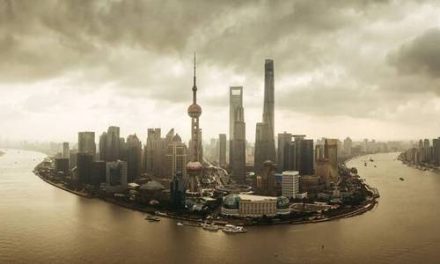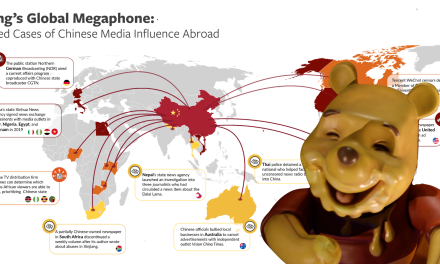BY BRADLEY A. THAYER AND LIANCHAO HAN
Threat deflation is a rare thing in international politics. Many governments have a tendency to overestimate threats, not underestimate them. The rise of the People’s Republic of China is the poster child of how threat deflation — or underestimating threats — can be done expertly. It explains how China was able to prevent effective balancing against its aggression for decades. As Sino-American security competition increases and the bilateral relationship worsens, this issue likely will receive greater interest.
China has successfully deflated its threat in the West through two discrete and effective tactics. The first is an ancient one: rewarding the avarice of political leaders and opinion-makers is as old as recorded history. China’s investment in Western political, business, intellectual and opinion elites is complicated but is, fundamentally, an investment in the personal financial success of these elites, including their families, friends and partners. In turn, this results in a personal investment in China’s success — of the growth of its economy, closer economic ties, and ever-expanding political power and influence.
Lamentably, this can cause a lack of a serious examination of the deleterious consequences of China’s rise on the West’s national security interests. This investment — in essence, a stake in China’s growth — results in the implicit message from the elites to the leadership and rank-and-file members of the national security bureaucracies, as well as to other institutions, that the negative implications of China’s rise should not be explored.
Second, China employs the United Front Work Department, which is considered a most critical component of the Chinese Communist Party (CCP); in fact, it is one of three magic weapons to win the party’s victory. The United Front exists as a formal part of the CCP to advance its interests and undermine, neutralize and defeat its enemies, often working through front organizations and clandestine agents or proxies to mask the CCP’s involvement. Whether operating through the formal United Front Work Department or an informal “united front,” they act to target elites through a collection of front organizations, academe, media and business, with a goal of influencing politics and policy and shaping perceptions about China and the CCP. For decades, the CCP has designated agents to maintain close contacts with key American political families.
Under Xi Jinping, China’s president and the CCP’s general secretary, support for the formal United Front Work Department and informal “united front” has greatly expanded. Soon after he came to power in 2012, Xi replaced the head of the United Front with a dynamic leader to energize the department. Alarmingly, he has come up with a “grand united front,” which requires the Chinese government to use its state power and assets to aggressively advance all aspects of the united front work, to help achieve China’s dream of great national rejuvenation. Under Xi’s direction, this “people’s war” has greatly enlarged its targets to “a wider circle of friends,” which includes 12 categories of individuals such as prominent businessmen.
China indeed has developed a wider circle of friends. But the consequences of its growing number of friends with influence are damaging for Western interests. As Clive Hamilton and Mareike Ohlberg document in their book, “Hidden Hand: Exposing How the Chinese Communist Party is Reshaping the World,” the world has witnessed verified or suspected “united front” influence operations, including in the United States and key U.S. allies such as Australia, Canada, France, Germany, New Zealand and the United Kingdom.
In September, it was revealed that China has digital dossiers on 2.4 million people around the world, compiled by the Shenzhen Zhenhua Data Information Technology Co., which is part of the united front. United front outreach is made to the Chinese diaspora of around 60 million as well, what the CCP calls the “qiaowu” (overseas Chinese affairs), to convince them to become firm believers in China’s ideology and sustain influence in their residing countries through policy lobby and election interference for the CCP.
The broader community also has been targeted by the CCP through the “Thousand Talents Plan” to recruit ethnic Chinese with valuable knowledge to come to China to live and work, or to remain in place but still participate in aiding the growth of China’s economy and technological advancement. These examples are only a précis of the grand united front’s operations; the actual magnitude and scope are, perhaps, beyond easy imagination.
Without a doubt, China’s investment in friends and other efforts at threat deflation have succeeded. Its economic growth continues, as does its global influence, the modernization of its military, and its technological progress. Friends in high places are rewarded. The corruption and compromise of any American elites has resulted in little focus on the power of China and the nature of its ideology, until the Trump administration’s efforts to expose China’s threat to the liberal international order. Yet there remains a reluctance in the West to recognize this threat and balance against it.
The West must return to an accurate assessment of the China threat. This requires clear statements from Western leaders denouncing the CCP for the totality of its actions. It requires increasing transparency by vigorously enforcing foreign agency registration and reporting China’s funding of its influence operations and ties to Western businesses, media, universities and political parties and politicians. The West must expose the CCP’s ploy of a grand united front, stop it from taking advantage of our openness, and impose bans against its fifth column that undermines our democracy.
Moreover, we need greater awareness among Western elites and populations of what will be lost, particularly in the realm of human rights, if China does become the world’s dominant power.
This article first appeared in The Hill on 10/28/20 8:00 AM ET



















